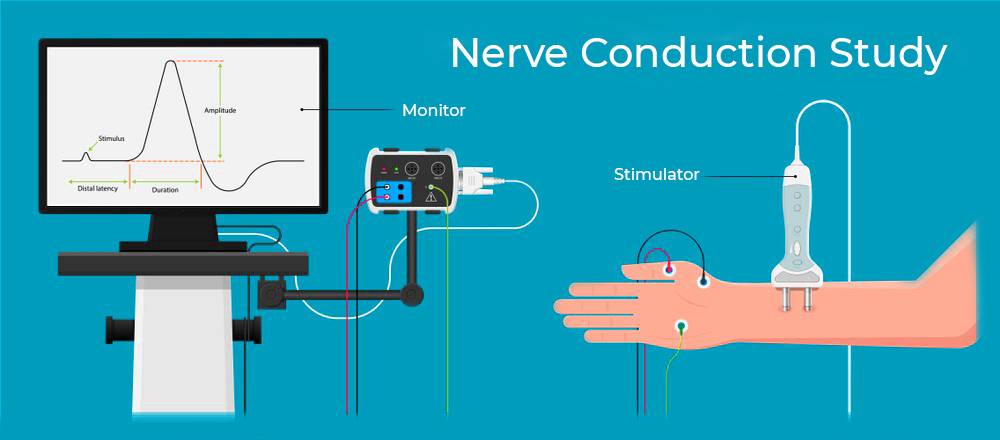Nerve Conduction Study (NCS)
Nerve Conduction Study (NCS): Understanding Peripheral Nerve Function
A nerve conduction study (NCS) is a valuable diagnostic test that evaluates the functionality of peripheral nerves, which are the nerves outside the brain and spinal cord. This non-invasive procedure helps detect and assess peripheral nerve damage and is often performed alongside an electromyography (EMG) test.
What Can a Nerve Conduction Study Diagnose?
NCS is particularly useful in diagnosing conditions like peripheral neuropathy and nerve compression syndromes. Peripheral neuropathy occurs when the peripheral nerves are damaged, and it can be caused by various factors such as diabetes, vitamin deficiencies, alcohol use disorder, autoimmune conditions, infections, medications, trauma, or surgery. On the other hand, nerve compression syndromes result from pressure on a peripheral nerve, leading to conditions like carpal tunnel syndrome, sciatica, and thoracic outlet syndrome.
Understanding the Difference Between NCS and EMG
While often performed together, NCS and EMG are distinct tests. While NCS measures the electrical signals' transmission and speed along peripheral nerves, EMG focuses on assessing the electrical activity produced during muscle contractions. By combining both tests, healthcare providers can better pinpoint the source of a patient's symptoms.
How Does the Nerve Conduction Study Work?
Nerves function like electrical cables, transmitting signals between the brain and the body. During an NCS, electrodes are placed along specific nerve pathways, and a mild electrical shock is delivered to stimulate the nerve. The electrodes then record the electrical current's speed and strength. Healthy nerves transmit signals at speeds of up to 120 miles per hour, but damaged nerves will show slower and weaker currents. The test helps identify the exact location of nerve injuries or issues.
Preparing for the Nerve Conduction Study
Before the test, it's essential to bathe or shower and wear comfortable, loose-fitting clothing. Avoid applying creams, lotions, or perfume on your skin, as they can interfere with the test's accuracy. If you have a pacemaker or any other electrical medical device, inform the healthcare provider performing the study.
What to Expect During the Nerve Conduction Study
During the test, you will be seated or lying down. Electrodes will be placed on your skin above the nerves being assessed, as well as on the muscles controlled by those nerves. A small electrical impulse will be delivered to the nerves, and you may experience a mild tingling sensation. The time it takes for your muscles or skin to respond to the nerve signal will be recorded. The process will be repeated for each nerve being examined, and an EMG test might follow.
Is the Nerve Conduction Study Painful?
The electrical stimulation may cause a brief startle or tingling sensation, similar to static electricity. However, it is generally not painful, and most people can complete the test without any issues.
How Long Does the Nerve Conduction Study Take?
The duration of an NCS can vary, typically ranging from 15 minutes to an hour or more, depending on the number of nerves being tested.
Understanding the Risks
Nerve conduction studies are considered safe. While the electrical pulses may cause temporary discomfort, they are generally well-tolerated by patients.
We hope this information helps you understand nerve conduction studies better. If you have any concerns or questions, don't hesitate to reach out to our medical professionals.





